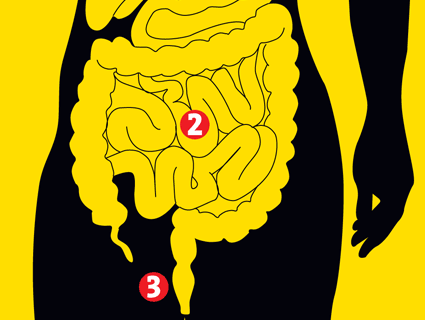
<a href="http://www.istockphoto.com/photo/happy-man-showing-thumbs-up-inside-the-aircraft-39868166?st=f2379b3">travnikovstudio</a>/iStock
About a quarter of deaths around the world are caused by infectious diseases—a number that is expected to increase with rising rates of antibiotic resistance. In the race to catch these diseases before they spread, international disease surveillance systems typically rely on reporting from doctors after infections occur, which can lead to dangerous delays and even more transmissions.
But a group of scientists have suggested a new way to quickly detect diseases: poop. More specifically, poop collected from international flights.
Researchers from the Technical University of Denmark argued in a piece recently published in the journal Scientific Reports that airports could identify infectious diseases immediately by analyzing the bacterial DNA from the waste collected in the tanks beneath onboard lavatories.
“What we did was take a single sample from the entire mixed toilet waste from each plane, purified the DNA, and sequenced everything,” says Frank Møller Aarestrup, who heads the Research Group for Genomic Epidemiology. After sequencing poop samples from 18 international flights, the scientists were able to compile plane profiles that showed the prevalence of common pathogens and the how many antibiotic-resistant bacteria were also on board.
Aarestrup says the process requires just one lab analysis, and he and his team are now recommending that airports have their own sequencers, which he estimates would cost around $150,000 in equipment and one full-time employee. “Not so much, the impact considered,” he adds.
It sounds like a great solution, but it may not be as easily implemented as Aarestrup and his team suggest.
Jonathan Eisen, a professor at the Genome Center at the University of California-Davis, says he doesn’t think the science is quite there yet. “Yes, people may shed various pathogens that go into the sewer system,” he says, “but we still don’t know what to look for and how to detect these organisms at low levels.”
Though the data showed promise, Eisen says, there are still many unknowns and far too much complexity involved in trying to drill down into this kind of information to have a functioning surveillance system. And there are a series of other obstacles that still have to be considered.
“There are issues of privacy that they didn’t address at all or issues of false-positive correlations that you might detect,” he explains. “It is really cool to get data from global populations, and I think it is going to be really useful for some purposes. But I don’t see screening sewage systems in airport facilities as a proven avenue for doing that.”
Unfortunately for now, Eisen says, successful poop surveillance is just an exciting hypothetical.
“It is interesting—really interesting, actually,” he says. “But I think right now it is a research project. A cool, fun project on microbial diversity and the human environment that is unquestionably worth doing, but without any obvious use yet.”













